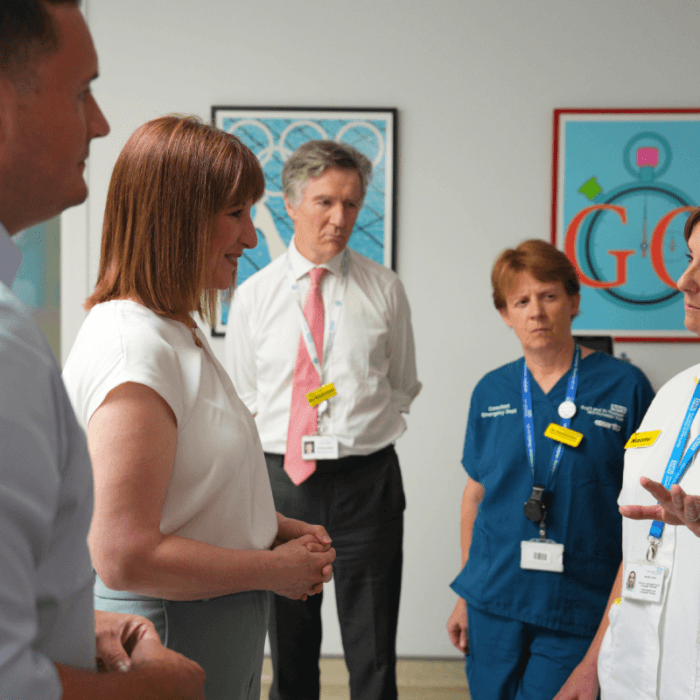Delivering the announcement in east London on Thursday, Starmer said the changes will build an “NHS that is fit to face the future” and will address the long-standing problems in the health system.
Under the plan, neighbourhood health centres (NHCs) will be expanded, while the service will train more GPs and make same-day appointments more widely available. The move is part of a broader shift to reduce the NHS’s reliance on hospitals.
“We will shift the NHS away from being a hospital dominated service to being a community, neighbourhood health service,” said Starmer.
He added that patients won’t need to book an appointment and instead will benefit from what he described as “care on your doorstep.”
Each NHC will act as a one-stop shop for patient care, operating at least 12 hours a day, six days a week. These centres will host multidisciplinary teams and will be prioritised in areas with the lowest healthy life expectancy.
Ministers said that delivering more urgent care directly in the community or at home could end the traditional outpatient hospital model by 2035.
Alongside these structural changes, the government plans to shift the overall pattern of health spending.
While hospital care currently consumes a significant share of the NHS budget, ministers have committed to rebalancing investment towards community and out-of-hospital services.
Focus on Prevention
Starmer pledged to transform the NHS from “a sickness service” into a “genuinely preventative health system.”“That means a stronger focus on vaccination, on screening, early diagnosis, and innovative weight loss services, which could be available in pharmacies; working with major food businesses to make their products healthier and better mental health support, particularly for our young people,” he said.
As part of this shift, the government will aim to increase uptake of the human papillomavirus vaccine among young people who have left school, aiming to eliminate cervical cancer by 2040. Plans are also underway to fully roll out lung cancer screening for individuals with a history of smoking.
One of the plan’s most ambitious goals is to make children born after 2025 the first generation in England who will never legally be allowed to buy cigarettes.
With the number of 11- to 15-year-olds regularly vaping having doubled in the past five years, the government will also ban advertising and sponsorship of vapes and other nicotine products.
Digitalisation of the NHS
The plan aims to overhaul how patient data are stored and accessed, in what the government described as a move “from bricks to clicks.”A single digital health record will be introduced for each patient, covering everything from prescriptions to test results. This aims to reduce duplication, prevent miscommunication between services, and save patients from repeating the same information multiple times.
The NHS App will be significantly upgraded and enhanced with artificial intelligence. It will offer 24/7 personalised health advice, allow users to book appointments, consult health care professionals remotely, and order repeat prescriptions.
“By 2028, the app will be a full front door to the entire NHS,” the document said.
Starmer also said the use of artificial intelligence and robotics will be essential to modernise the NHS.
“I’ve spoken to stroke patients whose lives have literally been saved by technology and AI, because it could find the blood clot in their brain in milliseconds, giving them just enough time to be operated on, and saving their lives,” he added.
Beyond patient-facing services, AI will be fully embedded in clinical practice to support NHS staff. Under the plans, AI will act as a “trusted assistant” to doctors and nurses, helping with diagnostics, clinical decision-making, and workflow management.
‘Managed Decline’
A coalition of NHS campaign groups has condemned the plan, describing it as “managed decline” disguised as reform.Organisations including Just Treatment, Keep Our NHS Public, and EveryDoctor argued the strategy relies on unproven technology and downplays chronic underfunding of the NHS.
The British Medical Association (BMA) warned that without fixing pay, improving conditions, and investing properly, the plan will not succeed.
BMA council Chair Dr. Tom Dolphin said that any shift from hospitals to communities must be properly resourced.
“Done too quickly and without thorough thought it risks heaping pressure on both hospitals and primary care by taking resource away from one while piling work on to the other,” he added.
The launch of the 10-year plan comes ahead of the 77th anniversary of the NHS this Saturday.







